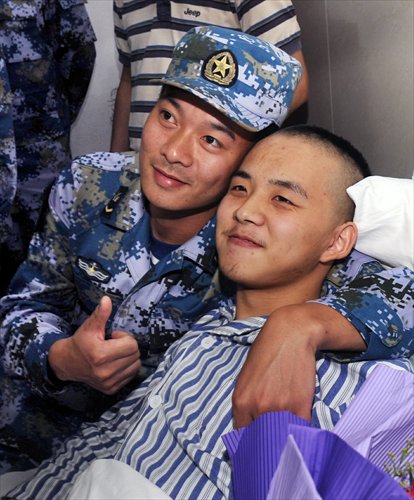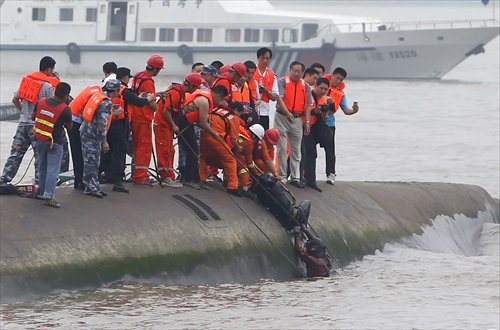HOME >> CHINA
Diver recalls traumatic moments of Yangtze ship rescue
Source:Global Times Published: 2015-6-12 5:03:01

Guan Dong (left) visits Chen Shuhan on June 7 who he rescued. Photo: CFP
Dressed in a black diving suit, Guan Dong was put under the spotlight when he was at his worst. His eyes were red, his hair soaking wet, and he had a bleeding nose. While this is how most people remembered Guan on the screen, it did not stop him from becoming a heroic figure in many people's eyes after he saved two lives on the Yangtze River in a tragedy that saw more than 400 others pass away.
Confronted with journalists' microphones, Guan looked less than composed in front of the media.
"I was only thinking about how to save more people," he insisted.
And he did just that. On a rainy day on the Yangtze River, when all held their breath for news of casualties from the capsized cruise ship Eastern Star, Guan brought back the only two lives detected under water, including one woman in her 60s.
Carrying 456 people traveling from Nanjing, East China's Jiangsu Province, to Chongqing, the ship capsized in the late evening of June 1 "all of a sudden," as survivors recalled, turning the ship into a giant tomb for most of its passengers.
Only 14 survivors were found, including the two people rescued by Guan on June 2. Hundreds of corpses were hauled or carried ashore during the rescue, cold and bloated. Another seven were still missing.

Chen Shuhan, a survivor from the sunken ship Eastern Star, is pulled up by rescuers on June 2. Photo: CFP
Dive into darkness
Guan has recalled his heroic rescue in many interviews, but always emphasizes his sense of disappointment.
"They [rescuers above the water] kept asking me if there were any more survivors. I had to tell them again and again that there were none," Guan said in an interview with China Central Television (CCTV). "I wish I could have said there were more."
Guan and his comrades from the Navy University of Engineering, People's Liberation Army (PLA), were among the first group of rescue teams to head for Jianli, Central China's Hubei Province, where the tragedy took place. Fourteen hours after the accident, Guan was ready to dive into the cold water on the rainy day of June 2.
"I was told before I dived that the water was cold and the current was strong, but it was even stronger than I had expected. It felt as if you were taking a cold shower on a winter day," Guan recalled.
But the darkness was even more terrifying, he admitted. "Even with the torch, I could only see about 20 centimeters ahead. I could not see my hands unless it was pressed against my helmet."
In the darkness, Guan fumbled ahead as he tried to locate the cabin door, while clearing away all the obstacles floating along the way. Following instructions, Guan found the 65-year-old woman, Zhu Hongmei, who was lucky enough to find a bedroom-sized space to escape from death. Zhu was clutching a pipe in the room, her other hand holding a torch. Only her feet were in the water.
"She cried the moment she saw me. Seeing that she was fully conscious, I tried to comfort her and kept on telling her that many people were waiting for her ashore," Guan told the Navy Today magazine.
"She had a strong instinct to live and was also very brave. It was very admirable," Guan said. But he added he was very sad when she kept reminding him that her family members were still somewhere in the ship.
But another survivor - Chen Shuhan - was curling up in the corner of an engine room and showed much less vitality. "He looked so mute and desperate. It was as if he had given up all hope for life. I tried to talk to him several times, but he did not respond. Finally, he said, 'You came,'" Guan said.
According to a recording made during the rescue, Guan continued to talk with Chen for almost half an hour in order to make the survivor more conscious of his situation. "Relax, buddy. I'm here with you," Guan said repeatedly.
Having been trapped for over 20 hours in the engine room, 21-year-old Chen began to cough out diesel - a sign that he was in critical condition. Guan took off his diving helmet and passed it to Chen, while he breathed in the thin diesel-smelling air in the room.
Guan looked serious when he explained his almost suicidal decision. "I also had a backup oxygen tank that could last about 20 minutes, but he looked as if he was dying," he said. "I had to be there with him to make him feel safe."
Under pressure
Meanwhile, all his family members were kept in the dark about his heroic deeds until it was all over the media.
All the phone calls that poured in following the CCTV reports were unanswered by Guan, who has been busy with the rescue mission until recently. "He replied with a text message to us all, saying that everything is fine," Guan's father said. "I just told him to be safe and do more to save more people."
Guan was born into an ordinary family in Ningguo, East China's Anhui Province. His father, Guan Changyuan, 52, is a local sanitation worker. Joining the navy had always been Guan's dream. Two of his uncles and one of his cousins were with the PLA Navy.
"I always felt it would be really cool to be able to put on the navy's uniform," Guan told Navy Today. "As for why I became a diver, I was curious about the job and saw it as a good challenge to train myself."
Guan joined the navy in 2007, where he first challenged himself by learning how to swim for the first time in his life.
Guan's family said they were not surprised to see Guan becoming so well-trained, as he has always been a careful and persevering child.
At the age of 6, Guan accidentally fell into a deep water well. The young Guan managed to hold on to a crack in the wall of the well for more than an hour before he was saved, according to Nanjing-based newspaper Modern Express.
For his bravery in the Yangtze River rescue, Guan was given a first-class merit award by the university and was greeted by Premier Li Keqiang. But Guan often emphasized that it was all his comrades who supported the rescue team during the mission, and they should all be known as heroes.
Newspaper headline: Reluctant hero
Posted in: Profile